GamesRadar+ Verdict
The Panasonic SoundSlayer is a solid little audio solution for anyone looking for an all-in-one speaker for their PC gaming and desk setup. There are a few gripes, and while its audio is great, it can't quite excel like more traditional soundbars and brands, but it'll still do the job - and then some.
Pros
- +
Solid one-speaker audio solution
- +
Surprisingly varied, rich, and punchy sound
- +
Compact size
Cons
- -
Limited audio when compared directly competitors
- -
Plain, borderline-ugly design
- -
Annoying HDMI-only connectivity
- -
Sub-par remote
Why you can trust GamesRadar+
The Panasonic SoundSlayer sound bar is aimed squarely at being a solid and gaming-focused, one-speaker solution - and, for the large part, it delivers.
Doing away with a dedicated, separate subwoofer, and streamlining connectivity, it's aiming to muscle in on the best computer speakers by nailing the USPs of a single-unit setup and providing great audio at the same time. We all might not have thought of Panasonic delivering such dedicated gaming audio, but here we are - and, on the whole, it sounds great.
Design & Features
But, first of all, it doesn't really look great... It's very blocky, and plain, and, well, a bit boring. Whereas the soundbar market, particularly those meant for TVs and living spaces, has grown to offer a whole host of different units, but generally good-looking audio units, the SoundSlayer seems to have missed that memo. Still, the silver lining of the rectangular box design, is that it doesn't take up much deskspace at all, and that's very neat.
You could negate the plain aesthetic by aiming to bag the special edition Final Fantasy XIV edition though; that's got some extra design and aesthetic flourishes that could appeal to some. It would still be its blocky, oblong self though.
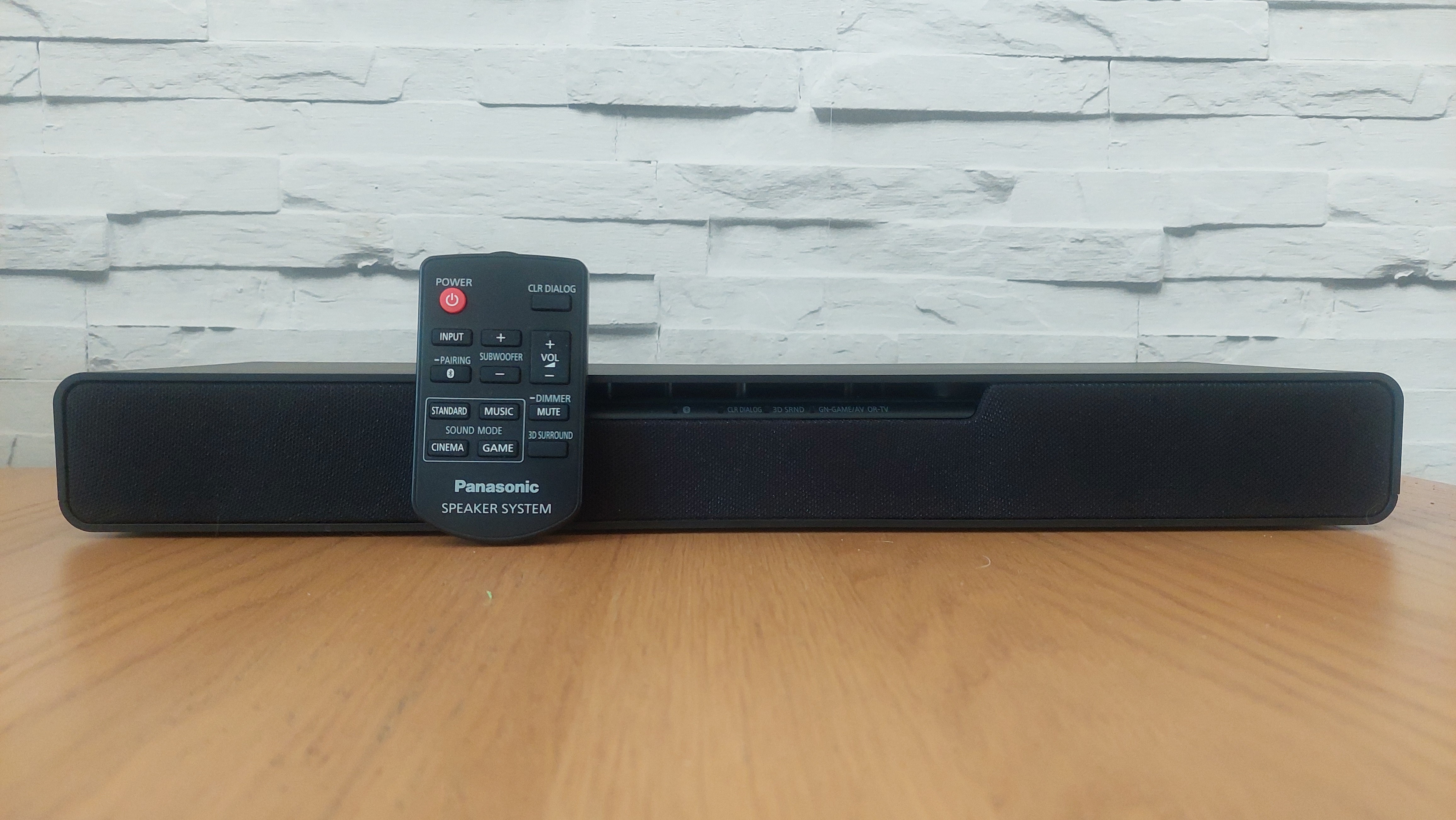
This small design also does highlight the fact that the SoundSlayer is very much aimed at PC and desktop use - rather than for under a TV - but its connectivity offering does almost counter that, and has left me ab it confused.
Because in terms of connections there are only two means to do so, and only one true means to get the best out of it if you really area using it as a main speaker for all your games - and at $300/£300, you would be wanting to, I'd wager. There is only an HDMI (ARC) connection available physically, and while it does have Bluetooth, this is only 2.0 or 2.1. In terms of the latter, we wouldn't recommend it for gaming anyway but Bluetooth has moved on so far now, that I feel it should be offering Bluetooth 5.0 like others do.
Speakers: 2 x 1.57in (4cm) full-range cones; 2 x 0.55in (1.4cm) tweeters; Built-in subwoofer: 1 x 3.1in (8cm) cone, 2 x 3.1in (8cm) passive radiators
Dimensions (HxWxD): Soundbar: 2 x 16.9 x 5.2in (52 x 431 x 132 mm)
Weight: 3.96lb (1.8kg)
Connectivity: Bluetooth 2.1, HDMI ARC
Price: $299.99/£299.99
Tested on PC.
So as it's aimed at living on a desk and under a monitor, thus used on PC< a USB connection would have been ideal and perfect. Heck, I'd even take an analog audio jack connection too! That's because the HDMI connection, I found, on PC was a bit of a pain, and not quite as seamless as, well, any other kind of audio connections I've used - more on this later, anyway.
As a result, this connectivity setup means the SoundSlayer, in a way, is kind of caught between an 'under TV' soundbar, and a desktop gaming soundbar: the HDMI ARC connection would be ideal for a TV, but this is clearly designed to be used on a desk for gaming on PC, so why isn't there another, PC-friendly connection - like a USB port? It's a little baffling; I'm not sure how adding that connection would have ruined the inside working of the soundbar (caveat: I am not an AV engineer).
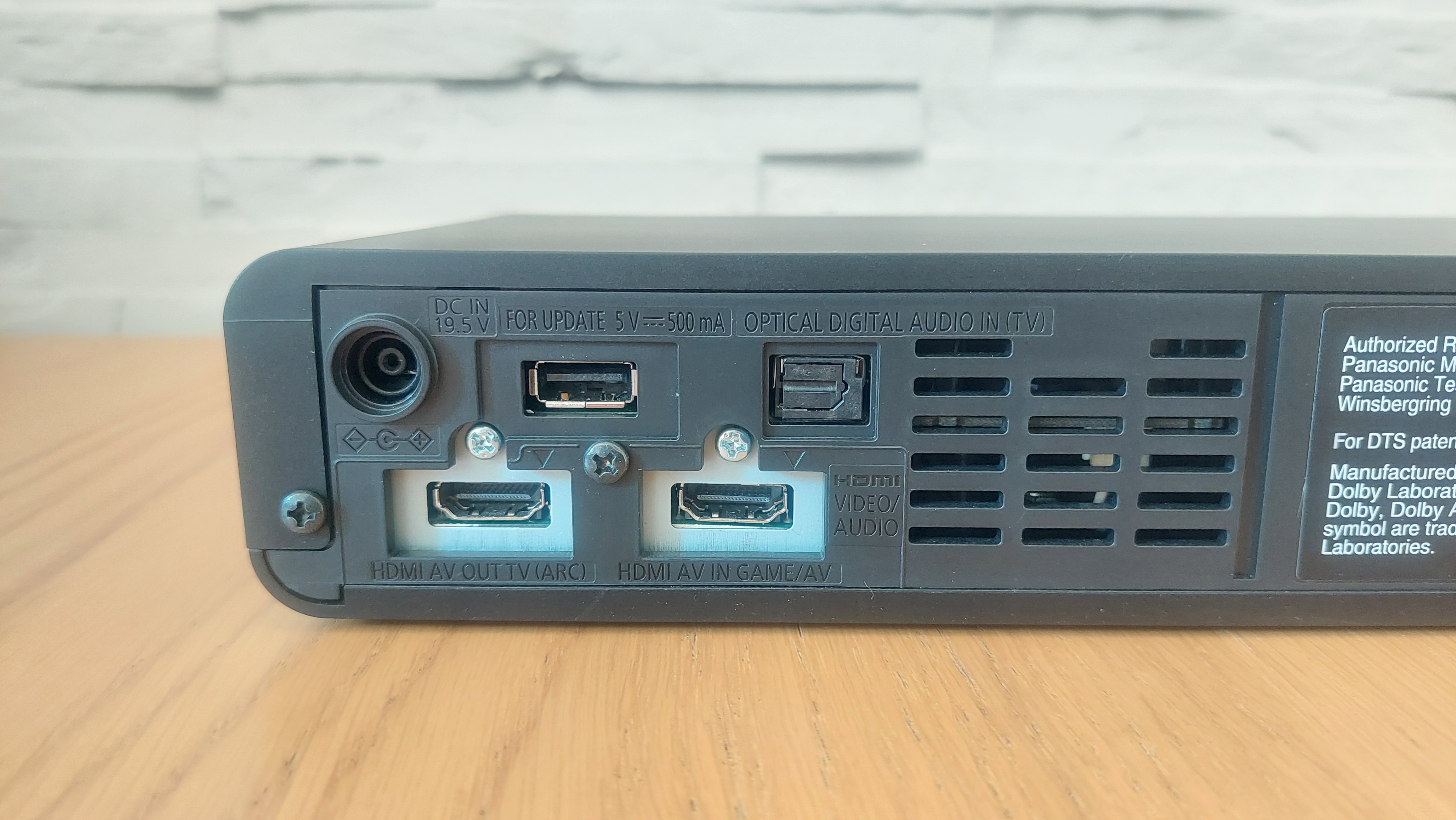
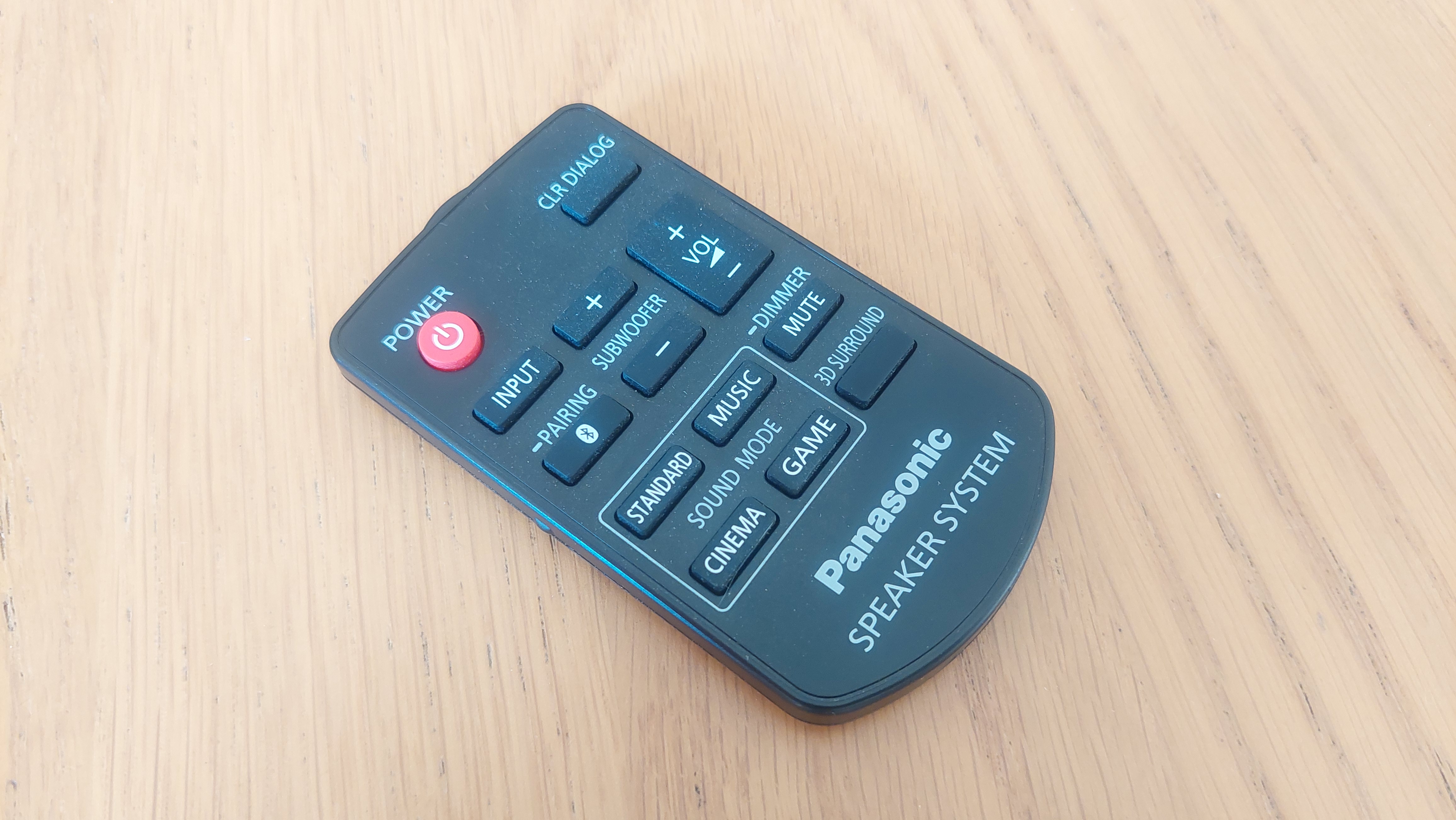
The last feature, physically, is the remote: it's small, plasticky, and quite disappointing. Especially for the price tag of the soundbar. You'll probably use the on-unit controls most of the time anyway (located on the right-hand side of the box - I know I did during my time with it - but if you're going to offer a remote, you could make it a bit more classy, tactile, and nice to use.
Performance
Overall, I was and am impressed by the audio quality the little SoundSlayer box can put out. Given its diminutive size, it's still punchy, pretty rich, and varied. Of course, there are limitations in terms of directional audio, so it didn't prove great for knowing where enemies were in shooters, but for games like Red Dead 2, it presented the soundscape pretty impressively. It was also equally adept with strategy games, not known audio demanders, but still, it was pleasant audio, and details were presented well. It was also good for everyday use with music and podcasts as well. It might not look pretty but its sound quality and range genuinely pack a bit of a punch.
The built-in audio modes (Game, Standard, Music, Cinema) are good too, with each offering differences and nuances to the audio that are likely to fit many scenarios. I found myself using the game setting pretty much all the time, and - this is crucial - keeping the 3D/Surround sound setting on. Of course, it's not truly surround sound in a 'it literally surround your person or ears' way that the best gaming headsets, or massive surround sound speaker systems do, but it genuinely is good. It made everything, games, music, podcasts, you name it, sound richer and more rounded than the default setting. It's also got all the Dolby audios and DTS's too, which is great.
The sound quality is called into question when it's side by a side with a competitor,. however. I had a brief window where I could test the SoundSlyaer against the Yamaha SR-C20A soundbar, and, despite costing less, I should say, the limits of the SoundSlayer's audio are immediately apparent. This is not to say it's 'bad' in any way, but the difference is notable when compared directly.
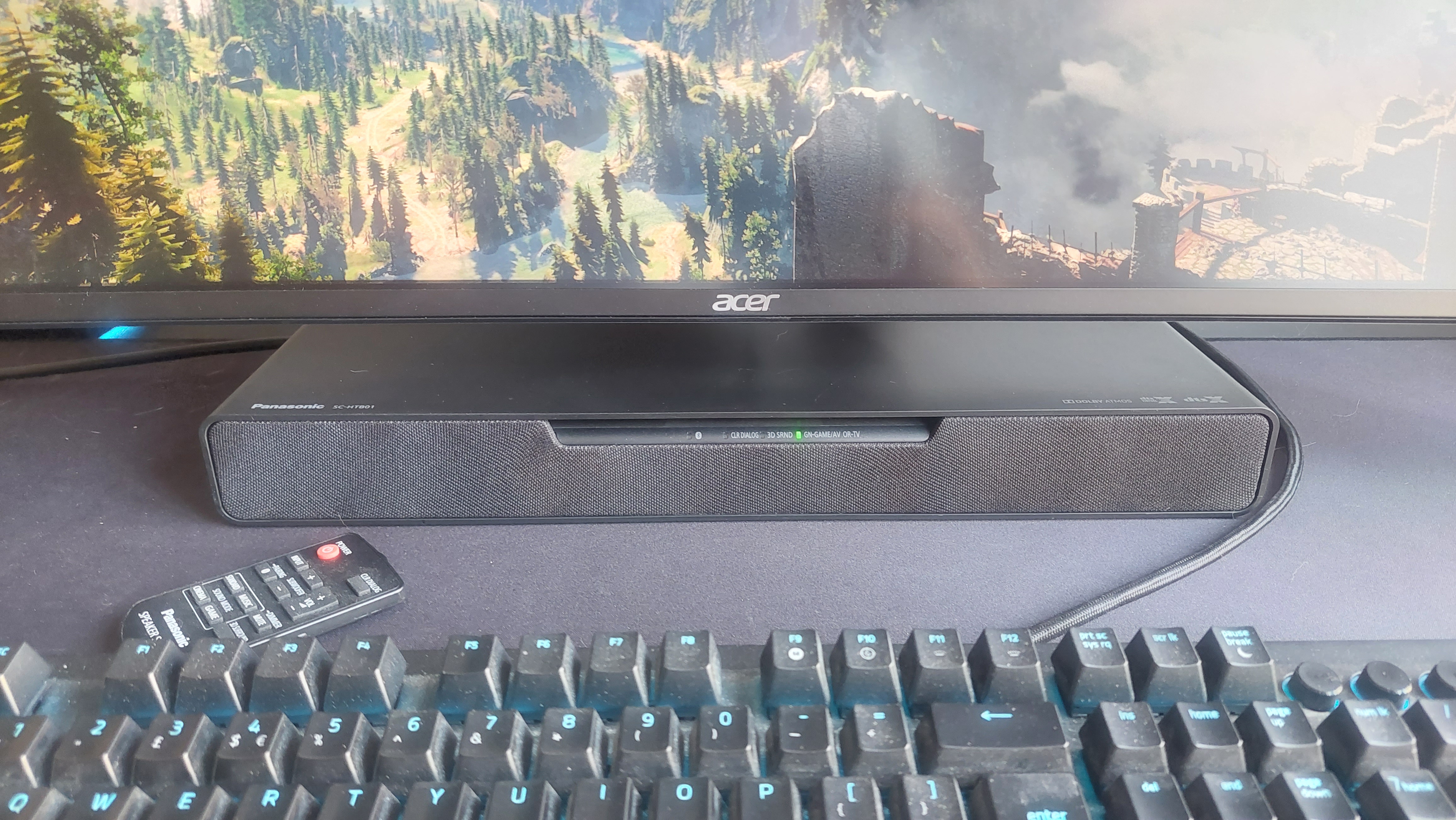
What it does perform well at is being a solid single-unit solution for those of us with standing desks. I am constantly up and down on my standing desk, and soundbars I've recently reviewed that had dedicated sound bars, like the Razer Leviathan V2 and the Creative Soundblaster Katana V2, have made it difficult to get a good bass balance right. And especially difficult to get bass, and thus rounded audio, settings right at both sitting and standing positions.
As mentioned earlier, the HDMI-only connection (Bluetooth aside) was quite irksome - though some of this is down to Windows. Of course, as it's an HDMI, windows immediately recognised the input (great) but then only and always recognised it as an extra monitor (bad). This means, for my setup, I had to rejig my display settings and screen layout and also experienced times when the HDMI connection just wasn't reliable, or wouldn't output the audio. I did get into a rhythm and groove with it eventually, but a USB or audio jack would have made life so much easier. Though granted, the ability to deploy the HDMI connection with a monitor and use it as a pass-through is a bonus - though would incur more cables and bits to manage.
Should you buy the Panasonic SoundSlayer soundbar?
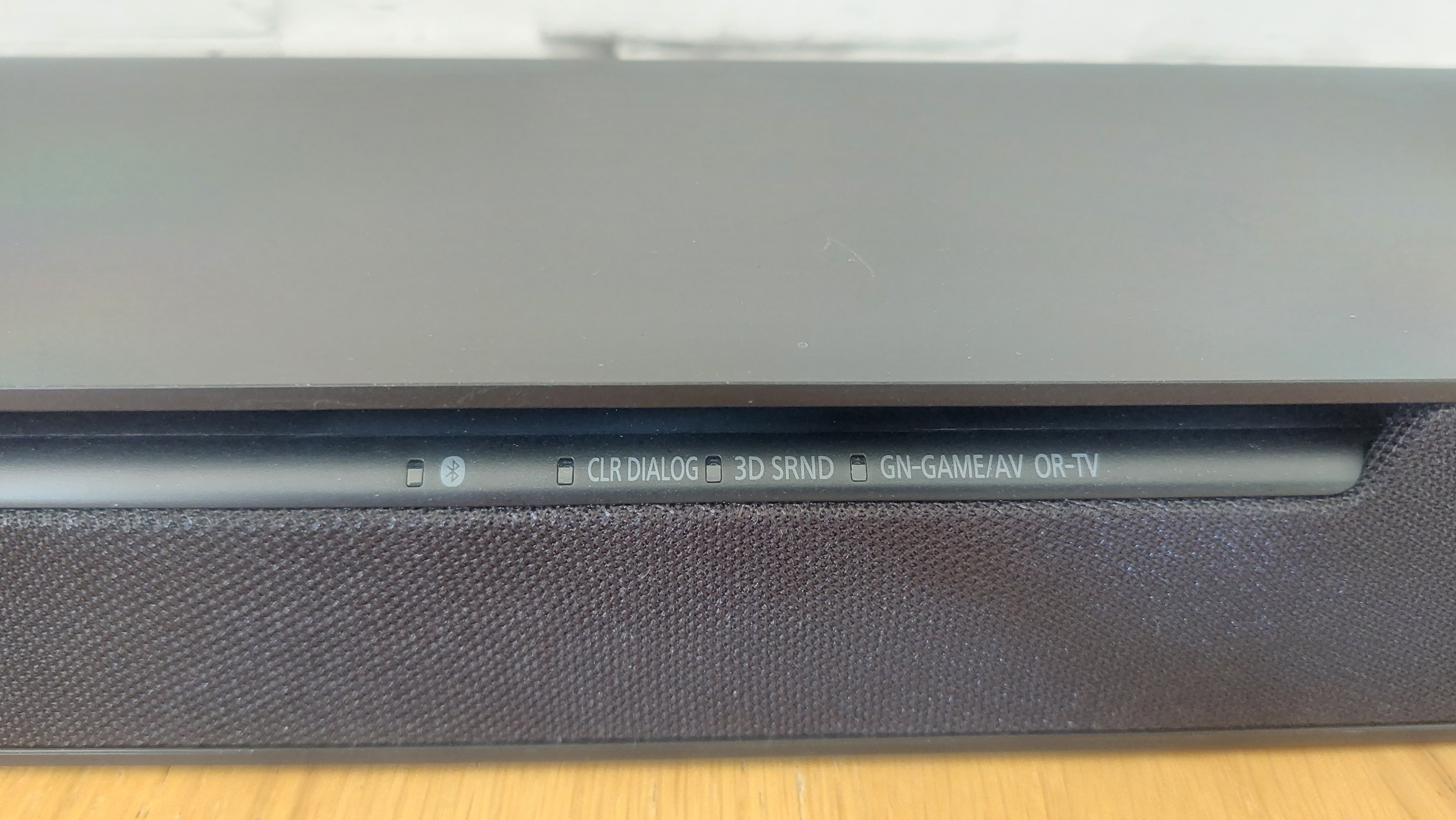
The Panasonic SoundSlayer is a pretty solid stab at being a one-and-done solution to gaming audio. If you're looking at single-unit setups then the SoundSlayer with its tidy 2.1 offering will be on your shortlist, for sure.
However, coming in at the $300 mark is going to be a bit much for some. Especially in the face of the likes of the much cheaper Yamaha SR-C20A (my review of which is incoming, but has already greatly impressed me). These two elements combined, as well as the connection issues I had, do make it hard to be a nailed-on recommendation, but it's certainly a great package. Those HDMI connection grips I had may not be so irksome for some folks too, and the passthrough will help with that, but the remote and aesthetic of the unit are disappointing.
However, those are swallowable should you be looking for a solid, gaming-focused single speaker solution: there's a lot of sound in this small box, and the range, depth, and richness are quite surprising and the 3D audio setting really brings this to life.
How we tested the Panasonic SoundSlayer
I used the Panasonic SoundSlayer as my daily driver for all audio for a period of several weeks. It sat under my monitor and on my sit-stand desk providing audio for calls, music, games, and movies so I could give it a thorough evaluation. The soundbar was used across a whole host of different games from open-worlds to strategies to shooters, and with music of multiple genres to get a good feel of its capabilities.
I was able to A-B test it against the Yamaha SR-C20A to compare the SoundSlayer directly against a competing unit to give more context and reference too.
You can read more about our hardware approach to all the gear we get our hands on in our full GamesRadar+ Hardware Policy.
Tested on PC with a Razer Blade 15 laptop supplied by Razer and with an Acer Predator X38 monitor from Acer.
If you're looking to up your display game as well as your audio game, then check out our best gaming monitor, best ultrawide monitor, and best curved gaming monitor guides.
Rob is the Deputy Editor of sister site, TechRadar Gaming, and has been in the games and tech industry for years. Prior to a recent stint as Gaming Editor at WePC, Rob was the Commissioning Editor for Hardware at GamesRadar+, and was on the hardware team for more than four years, since its inception in late 2018. He is also a writer on games and has had work published over the last six years or so at the likes of Eurogamer, RPS, PCGN, and more. He is also a qualified landscape and garden designer, so does that in his spare time, while he is also an expert on the virtual landscapes and environments of games and loves to write about them too, including in an upcoming book on the topic!




